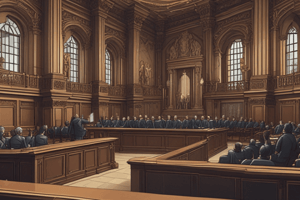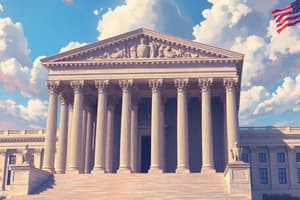Podcast
Questions and Answers
What can the Supreme Court rule on the constitutionality of a law?
What can the Supreme Court rule on the constitutionality of a law?
Using judicial review, they can strike down a law they deem unconstitutional.
What do US Attorneys do?
What do US Attorneys do?
Represent the US government in federal court cases.
What decisions can appeals courts make?
What decisions can appeals courts make?
- Dismiss
- Remand (correct)
- Overturn (correct)
- Uphold (correct)
What are the main reasons federal judges are given tenure?
What are the main reasons federal judges are given tenure?
The Court's decision in Plessy v Ferguson provided the legal justification for what?
The Court's decision in Plessy v Ferguson provided the legal justification for what?
What types of trials are held in district courts?
What types of trials are held in district courts?
How do judges use precedent when arriving at an opinion?
How do judges use precedent when arriving at an opinion?
What was the significance of the decision in Marbury v Madison?
What was the significance of the decision in Marbury v Madison?
What was established by the Judiciary Act of 1789?
What was established by the Judiciary Act of 1789?
Who appoints federal judges?
Who appoints federal judges?
How many circuit courts are there?
How many circuit courts are there?
Who can limit the power of the Supreme Court?
Who can limit the power of the Supreme Court?
In which article of the Constitution is the Supreme Court outlined?
In which article of the Constitution is the Supreme Court outlined?
Which Supreme Court ruling from the early 1800s showed the limits of the Supreme Court?
Which Supreme Court ruling from the early 1800s showed the limits of the Supreme Court?
What cases do federal courts have exclusive jurisdiction?
What cases do federal courts have exclusive jurisdiction?
What kinds of cases are heard in federal courts?
What kinds of cases are heard in federal courts?
What are appeals courts?
What are appeals courts?
What is a concurring opinion?
What is a concurring opinion?
What does it mean for a law to be constitutional?
What does it mean for a law to be constitutional?
What does a district court do?
What does a district court do?
What is a docket?
What is a docket?
What is exclusive jurisdiction?
What is exclusive jurisdiction?
Who are litigants?
Who are litigants?
What is a majority opinion?
What is a majority opinion?
What does it mean to nullify?
What does it mean to nullify?
What is a unanimous opinion?
What is a unanimous opinion?
What is appellate jurisdiction?
What is appellate jurisdiction?
What is a brief?
What is a brief?
What is concurrent jurisdiction?
What is concurrent jurisdiction?
What is a dissenting opinion?
What is a dissenting opinion?
What is judicial review?
What is judicial review?
What is original jurisdiction?
What is original jurisdiction?
What is a precedent?
What is a precedent?
What does it mean to remand?
What does it mean to remand?
What is stare decisis?
What is stare decisis?
What are writs of certiorari?
What are writs of certiorari?
Flashcards are hidden until you start studying
Study Notes
Judicial Review and Constitutionality
- Supreme Court can rule on the constitutionality of laws through judicial review, allowing it to strike down unconstitutional laws.
- Judicial review was established in Marbury v. Madison, asserting the Constitution as the supreme law and defining the court's role in upholding it.
Roles of Federal Attorneys and Judges
- U.S. Attorneys represent the government in federal court cases, ensuring adherence to federal laws.
- Federal judges have lifetime tenure to prevent external influences, like public opinion, from affecting their decisions.
Appeals Courts and their Decisions
- Appeals courts can uphold, remand, or overturn lower court decisions, maintaining a system of checks.
- They serve to review and confirm the correct application of law in prior cases.
Supreme Court Decisions
- The ruling in Plessy v. Ferguson legitimized segregation, establishing "separate but equal" as a legal doctrine.
- Worcester v. Georgia exemplifies the limitations of the Supreme Court when an executive branch ignores its rulings.
Court Types and Jurisdictions
- District Courts handle civil and criminal trials, possessing original jurisdiction to hear cases first.
- Federal courts have exclusive jurisdiction over interstate disputes and cases involving foreign diplomats.
- Appellate jurisdiction allows higher courts to review lower court decisions, while concurrent jurisdiction permits both state and federal courts to hear certain cases.
Court Proceedings and Legal Terms
- Briefs are written arguments submitted by lawyers in Supreme Court cases.
- Dockets outline a court's schedule, displaying cases set for hearing.
- Terms like "precedent" and "stare decisis" are pivotal in maintaining legal consistency, ensuring that earlier decisions influence current rulings.
Court Opinions
- Distinctions exist between various types of opinions:
- Majority Opinion reflects the view of most justices.
- Concurring Opinion agrees with the majority but offers different reasoning.
- Dissenting Opinion expresses disagreement with the majority ruling.
- Unanimous Opinion indicates complete agreement among justices.
Key Legal Concepts
- Judicial review permits courts to nullify laws that contradict the Constitution, reinforcing the principle of legality.
- Original jurisdiction is the authority of trial courts to hear cases first, establishing essential facts in legal disputes.
- Writs of certiorari are formal requests for the Supreme Court to review a case, allowing it to selectively hear significant legal issues.
Limits on the Supreme Court
- The legislative branch holds the power to limit the Supreme Court's capabilities and jurisdiction, maintaining checks and balances within the government structure.
Studying That Suits You
Use AI to generate personalized quizzes and flashcards to suit your learning preferences.





